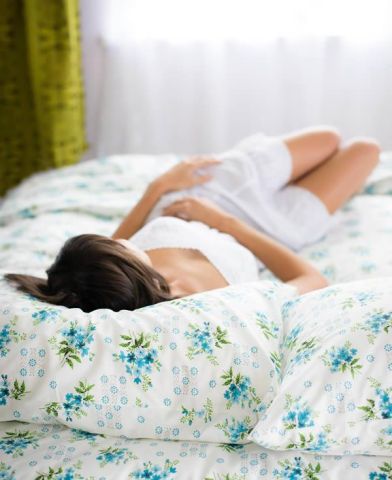
How to Minimize Endometriosis Symptoms and Get a Better Sleep
The article begins:
There’s no doubt that sleeping is good for you. Who doesn’t enjoy waking up after a good night of sleep? Your body goes through a number of changes as you sleep, allowing you to get the rest you need for general health. Sleeping helps the body and brain to calm down and participate in healing processes, improving physical and mental performance both over the long term and immediately thereafter.
As we mention in this article entitled “Endometriosis and Sleep Blog: Improving Melatonin Levels“, with chronic pain conditions, such as endometriosis, sleep quality can be impaired. Sleep is essential for cognitive function, immune function, and overall health. The relationship between pain and sleep is a vicious cycle as pain can lead to poor sleep, but at the same time, poor sleep can increase sensitivity to pain and worsen depressive thoughts and thus experience a poorer quality of life. In fact, sleep disorders and changes in your melatonin level can have an effect on the reproductive system, not making it any easier to conceive.
With this in mind, the article continues:
So what can yo do to get a great quality of sleep? Do you count sheep or meditate? May be you drink a chamomile or lavender tisane; or perhaps you’ve heard that taking a hot tub bath or stretching before going to bed might be helpful for sleeping deeply…
David breaks the subject down into a number of sleep related quesitons, including:
- Can you share some tips to set a bedroom mood that promotes falling asleep faster?
- Please briefly explain what Circadian Rhythms are, and provide some tips to improve them for better sleep.
- Could you provide some tips to manage the symptoms and minimize the impact of narcolepsy at home?
- Regardless of the location or weather, what would you advice for sleeping better while tent or RV camping?
- What are the most common causes of nightmares or terrors and how can they be prevented?
- Please provide some tips to help new parents and newborns get more and better sleep.
- What should I look for in a mattress for children?
- How can people who work too many hours in front of a screen get more and a better/deeper sleep?
- Is CBD oil recommended to help achieve better sleep? Who can use this?
- Can you mention a few ways to detox a bedroom for a better quality of sleep?
The answers to the above can be found in the full article (link below), but for now we will concentrate on one question asked of yours truly regarding endo and sleep:
What advice can you provide to manage the endometriosis symptoms and minimize their impact on sleep?
Here’s what I had to say:
Endometriosis is a chronic pain condition that results in peripheral pain signals from the endometriosis lesions becoming amplified by the central nervous system (ultimately, by our brain). With poor sleep habits, there will be an effect on melatonin production, which will disrupt the circadian rhythm. Melatonin is essential for those that suffer from chronic pain, as it acts as an analgesic, sleep inducer, antioxidant, immunoregulatory and anti-inflammatory agent. Some research propose that improving melatonin can help reduce the symptoms of endometriosis, such as painful periods, bladder pain, painful bowel movements and other daily pains these patients often have such as low back pain.
Diet is another important discussion around improving sleep, too, but can be complex, as many patients with endometriosis have dietary restrictions. One study found that when women incorporate a diet rich in dairy products and fruits they had improved sleep quality compared to those that did not follow that diet. However, dairy is not a part of an anti-inflammatory diet, which has also been shown to help endometriosis patients. As everyone’s body is different, it’s best to work with a Gastroenterologist and a registered dietician to determine your best nutrition plan to minimize symptoms and improve sleep.
Exercise has also been shown to improve sleep through it’s effects on melatonin. Endometriosis is associated with insulin resistance, and regular exercise has been shown to increase cellular insulin sensitivity. This means that insulin resistance is decreased with exercise, however keep your exercise reasonable and moderate. I recommend activities such as hill walking, pilates, swimming or yoga to incorporate into your daily routine.
Pelvic health physical therapists are uniquely positioned to prescribe exercises specific to your tolerance levels. They also evaluate the need for additional interventions, such as hands-on therapies, corrective exercises, nervous system down regulation exercises and more.
Go here for the full article at Porch on how to get a better sleep.
